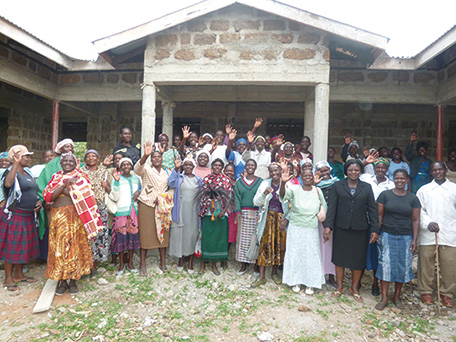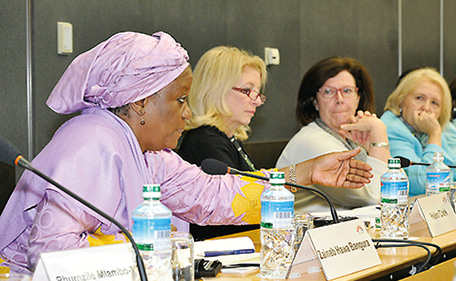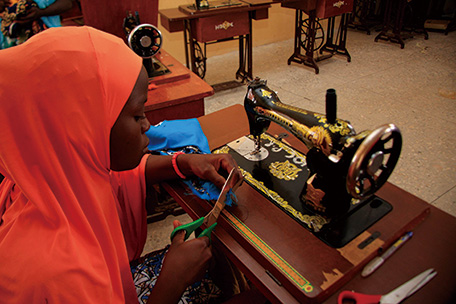(5) Gender
Much of the conventional wisdom and many of the social systems that exist in developing countries are generally formed from a male perspective, making women potentially vulnerable on various fronts. Even now, women do not enjoy the same opportunities as men to participate in decision-making processes, which are not restricted to high-level government decision-making but also include family and private decision-making that affects the lives of women.(Note 6) Women are critical agents of development, and their participation will lead to not only the improvement of their own lives but also to more effective development.
In order to achieve sustainable development, the promotion of gender equality and the improvement of the status of women are indispensable. For this purpose, it is important for men and women to participate equally in development and to equally reap the benefits.
< Japan's Efforts >
Japan's development cooperation to date has made it clear that it aims at improving the status of women in developing countries.
Recognizing women as important actors of development, Japan formulated the Initiative on Women In Development (WID) in 1995 to consider ways in which women could participate in every stage of development (development policy, project planning, implementation, monitoring, and evaluation). In 2005, the WID Initiative was fundamentally reviewed, and development issues stemming from the gender and roles of men and women in societies targeted for assistance were analyzed. This resulted in the formation of the Initiative on Gender and Development (GAD), which aims to realize sustainable and equitable societies.

A workplace for women in fishing villages is under construction through a project in Mbita in Homa Bay District, Western Kenya. Local women are looking forward to the completion of the center. (Photo: Rumiko Kashihara / Embassy of Japan in Kenya)

Ms. Zainab Hawa Bangura, Special Representative of the Secretary-General on Sexual Violence in Conflict, making a comment during the session of the sub-group 2 (Global Issues and Women's Initiatives) at WAW! Tokyo 2014 held in September 2014.
The WID Initiative focused on the three important areas of women's education, health, and participation in economic and social activities. The GAD Initiative brings a focus on the application of gender perspective to all areas and aims to improve the situation on gender equality, the vulnerable socioeconomic circumstances in which women are placed, and the fixed gender roles and duties for men and women. To promote gender mainstreaming* in development, the initiative identifies policies that would incorporate gender perspectives into every stage of development, including policy making, planning, implementation, and evaluation. Furthermore, it illustrates the relevance of gender to the priorities of development cooperation, namely poverty reduction, sustainable growth, addressing global issues and peacebuilding. It then specifically lays out how Japan's efforts should address these issues.
Japan has been offering assistance through UN Women, the UN entity founded in 2011 by merging four parts of the UN system to promote gender equality and the empowerment of women (skills and capabilities that allow women to solve problems on their own). In FY2013, Japan provided approximately $6.45 million and contributed to efforts for women's political participation, economic empowerment, ending violence against women and girls, strengthening women's roles in the fields of peace and security, and enhancing gender consideration in policy and budgets.
At TICAD V in June 2013, recognizing the empowerment of women and young people was one of the basic principles, and Japan announced its intention to promote efforts for the establishment of women's rights and expansion of employment and education opportunities, working together with African countries and development partners and others. In addition, in September 2013, Prime Minister Shinzo Abe expressed his intention to strengthen support for realizing “a society in which women shine” in his address at the 68th Session of the United Nations General Assembly. Specifically, in addition to the enhancement of the support through cooperation with the relevant agencies of the UN, such as United Nations Entity for Gender Equality and the Empowerment of Women, United Nations Development Programme (UNDP), United Nations Children's Fund (UNICEF), United Nations Population Fund (UNFPA), and World Food Programme (WFP), he announced that Japan would implement ODA in excess of $3 billion for the three years from 2013 to 2015 based on the three pillars of “Facilitating Women's Active Role/ Participation in Society and Women's Empowerment,” “Enhancing Japan's Efforts in the area of Women's Health Care as a part of its Strategy on Global Health Diplomacy,” and “Supporting Women's Participation and Protecting their rights in the area of Peace and Security.” Japan is steadily implementing this assistance.
In September 2014, the World Assembly for Women in Tokyo: WAW! TOKYO 2014 was held. Approximately 100 leaders in the area of women's issues from Japan and overseas discussed global themes and presented 12 recommendations in “WAW! To Do.”
- *Gender mainstreaming
- Gender mainstreaming refers to a means of achieving societal gender equality in all fields. The GAD Initiative defines gender mainstreaming in development as a process in which women's and men's development challenges and needs, as well as the impact of development on both men and women, are clarified throughout the processes of policy formulation, project planning, implementation, monitoring and evaluation, and are based on the premise that all policies, interventions, and projects impact men and women differently.
- Note 6: Source: The Millennium Development Goals Report 2013
| Nigeria
Project on Activation of Women Development Centres (WDCs) to Improve Women's Livelihood Phase 2
Technical Cooperation Project (February 7, 2011 – Ongoing)

A woman learning sewing skills. (Photo: JICA)
In Nigeria, there are significant gender gaps in the adult literacy rate, income, and other indicators, which have led to clear gender disparities. The roles of women at the community and household levels are also limited compared to men. To address such a situation, the Government of Nigeria has developed policy and institutional frameworks to promote gender equality, such as launching the Federal Ministry of Women Affairs and Social Development and establishing the National Gender Policy. In addition, since the late 1980s, the Government has set up more than 700 Women Development Centres (WDCs) across the country that provide literacy education and vocational training, mainly for women living in rural areas.
Despite such efforts, however, many WDCs were not providing sufficient services to women. Under such circumstances, based on a request from the Government of Nigeria, Japan implemented Phase 1 of the “Project on Activation of Women Development Centres (WDCs) to Improve Women's Livelihood” in Kano State in northern Nigeria from 2007 for three years. The project aimed to promote the use of WDCs as a place of learning and empowerment which contributes to improving the livelihood of poor women.
This project contributed to improving the quality of WDCs' services by training the instructors of education and technical training courses offered at WDCs, such as courses on literacy, sewing, cooking, dyeing, and soap making. The project also supplied equipment necessary for the implementation of the education and training courses. This has translated into economic gains for women who acquired these techniques and skills. In addition, women's scope of activities expanded and they became more confident of their remarks and decisions, leading to the further empowerment of women. Furthermore, in order to gain the community's understanding on women going to WDCs, the project sensitized various stakeholders, including men as well as religious leaders, village heads, and other influential people in the community. As a result, many people became supportive of women going to WDCs.
Based on the experience in Kano State, Phase 2 of the project which started in 2011 promotes the activation of WDCs in other states throughout the country. The project has developed the “WDC Activation Model” based on the four requirements needed for the activation of WDCs: (i) improvement of service quality; (ii) enhanced community understanding on women's participation in economic activities; (iii) improvement of management; and (iv) better coordination with related organizations. Although Nigeria has diverse religions and cultures, the project aims to ensure that this model functions in other states and to scale it up nationwide. (As of August 2014)
